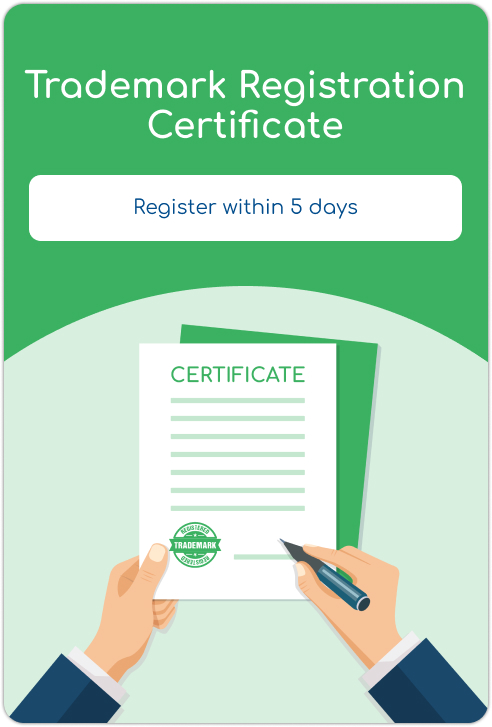
Trademark Registration Certificate
946 customers
What will you get?
Trademark filing
Registration Certificate
1 Trademark Class
What do we Require?
INR 18955 Taxes As Applicable






Introduction
A Trademark Registration Certificate is a legal document issued by the Indian Trademark Registry, affirming the successful registration of a trademark within India. This certificate serves as tangible evidence of the exclusive ownership rights conferred upon the trademark holder, granting them the unequivocal authority to utilize the trademark for their designated goods and services.
Key features of the Trademark Registration Certificate include:
- Proof of Ownership:The certificate attests to the rightful ownership of the trademark, establishing legal ownership and proprietary rights.
- Exclusive Usage Rights:It bestows upon the trademark owner the exclusive right to use the trademark for the specified goods and services, safeguarding against unauthorized usage by others.
- Official Registration Details:The certificate contains essential information such as the official registration date, class of goods and services, and the geographical region where the trademark is registered, providing clarity and transparency regarding the trademark's scope and jurisdiction.
- Valuable Asset:Recognized as a valuable asset, the Trademark Registration Certificate enhances the brand's reputation, credibility, and marketability, bolstering its competitive edge in the marketplace.
- Renewal Requirement:To maintain its validity, the Trademark Registration Certificate necessitates periodic renewal, ensuring continued protection and enforcement of the trademark rights.
Understanding Trademark Infringement
Trademark infringement occurs when an unauthorized party unlawfully uses a registered trademark or a confusingly similar mark without the owner's consent. The process of trademark registration, governed by the Trademarks Act 1999 and overseen by the Controller General of Patents, Designs, and Trademarks, plays a pivotal role in safeguarding against infringement.
Key points to note about trademark certificate infringement:
- Identifiable Symbol:A trademark serves as an identifiable symbol or expression distinguishing the source's products or services from those of others, thus safeguarding brand identity and consumer trust.
- Legal Protection:Trademark registration provides legal protection, enabling the trademark owner to take legal action against unauthorized use or infringement, thereby preserving brand integrity and market exclusivity.
- Preventive Measure:By registering a trademark, businesses proactively mitigate the risk of infringement, deterring unauthorized parties from capitalizing on the brand's reputation and goodwill.
Components of a trademark certificate:
- Trademark Details:The certificate includes detailed information about the registered trademark, such as the trademark name, logo, or symbol.
- Registration Number:Each registered trademark is assigned a unique registration number by the trademark authority, facilitating identification and reference.
- Registration Date:The certificate specifies the official date on which the trademark was successfully registered, marking the commencement of its legal protection.
- Goods and Services Classification:It indicates the specific classes of goods and services for which the trademark is registered, defining the scope of protection.
- Owner Information:The certificate identifies the owner of the registered trademark, including their name, address, and contact details.
- Validity Period:It states the duration of validity for the trademark registration, typically ranging from 10 years with the option for renewal upon expiration.
- Geographical Coverage:The certificate specifies the geographical region or jurisdiction where the trademark is registered, delineating the territory within which the trademark is protected.
- Trademark Symbol:Upon registration, the trademark owner is entitled to use the appropriate symbol (® for registered trademarks or ™ for unregistered trademarks) alongside their trademark, indicating its legal status and providing notice to the public of their exclusive rights.
- Trademark Renewal Requirements:The certificate may include information regarding the renewal process and requirements to maintain the validity of the trademark registration beyond its initial term.
Benefits of Trademark Certificate offer numerous:
- Legal Protection:A Trademark Certificate provides legal proof of ownership and exclusive rights over the registered trademark. It offers protection against unauthorized use, imitation, or infringement by others.
- Brand Recognition:A registered trademark distinguishes your products or services from those of competitors, enhancing brand recognition and consumer trust. It establishes a unique brand identity in the marketplace, fostering customer loyalty and preference.
- Market Exclusivity:With a registered trademark, you gain exclusive rights to use the mark for the specified goods or services within the designated geographical region. This exclusivity helps prevent competitors from using similar marks, reducing market confusion and dilution of your brand.
- Legal Recourse:In case of trademark infringement or unauthorized use, owning a Trademark Certificate provides you with legal recourse to enforce your rights. You can pursue legal action against infringers, seek damages, and obtain injunctions to stop unauthorized use of your trademark.
- Global Protection:The certificate identifies the owner of the registered trademark, including their name, address, and contact details.
- Validity Period:Trademark registration provides protection not only in your home country but also in foreign markets through international treaties and conventions. This allows you to expand your business globally while safeguarding your brand identity and reputation.
- Marketing Advantage:A registered trademark lends credibility and professionalism to your brand, giving you a competitive edge in the market. It signals to consumers that your products or services meet certain quality standards and are backed by legal protection.
- Deterrence to Copycats:The existence of a registered trademark acts as a deterrent to potential infringers and copycats. It notifies competitors and the public that your brand is legally protected, discouraging them from using similar marks or engaging in deceptive practices.
- Licensing and Franchising Opportunities:A registered trademark can be licensed or franchised to third parties, generating additional revenue streams for your business. It allows you to monetize your brand by granting others the right to use your trademark in exchange for royalties or fees.
- Brand Expansion and Growth:With a registered trademark, you have the freedom to expand your product line, enter new markets, and diversify your business offerings confidently. It provides a solid foundation for brand expansion and sustained growth over time.
The documents required for obtaining a Trademark Registration Certificate:
- Trademark Application Form:Complete and submit the prescribed trademark application form provided by the relevant trademark office or authority. The form requires details such as the trademark name, logo, or symbol; goods and services classification; owner information; and usage details.
- Trademark Specimen:Provide a specimen or representation of the trademark as it will be used in commerce. This may include a digital image or physical sample showing how the trademark will appear on products, packaging, or promotional materials.
- Proof of Trademark Use (if applicable):If the trademark is already in use in commerce, you may need to submit evidence of such use, such as product labels, packaging, advertising materials, or website screenshots demonstrating the trademark's use in connection with goods or services.
- Power of Attorney (if represented by an attorney):If you are represented by a trademark attorney or agent, you may need to submit a power of attorney authorizing them to act on your behalf in the trademark registration process.
- Trademark Assignment (if applicable):If the trademark is being transferred or assigned from one party to another, you may need to submit a trademark assignment document or agreement documenting the transfer of ownership rights.
- Priority Claim (if applicable):If you are claiming priority based on an earlier-filed trademark application in another country, you may need to submit a priority claim document or certified copy of the earlier application.
- Government Fees:Pay the prescribed government fees for filing the trademark application and processing the registration. The fees may vary depending on factors such as the number of classes of goods and services covered by the trademark.
- Identity Proof:Provide proof of identity and address of the trademark owner or applicant, such as a copy of a government-issued ID card, passport, or utility bill.
- Business Registration Certificate (for entities):If the trademark applicant is a legal entity such as a corporation or partnership, you may need to provide a copy of the business registration certificate of incorporation documents.
- Declaration of Trademark Ownership:Sign and submit a declaration affirming your ownership of the trademark and stating that all information provided in the application is true and accurate to the best of your knowledge.

